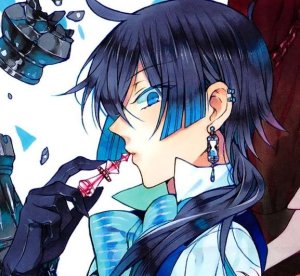Well, let's begin by saying I'm probably not the demographic for this drama. I gave a 7 to the first season and, if you've ever read my reviews, you know I'm not a fan of the "cutesy, naive, clumsy female lead falls for the serious, distant, seemingly cold and emotionally constipated male lead" trope. Still, Good Morning Call, out of the majority of the latest ones I've seen with this concept, is very easy to watch and doesn't get too tedious, plus it's well filmed and has Sakurada Dori, so I gave the new season a chance. And I ended up liking it a bit more than the last one.
Let's start with the things I liked. First and foremost, I appreciate that the growth of the characters (from High School to College) was paired with a bit more emotional complexity when it came to sentimental conundrums. The side characters, which I liked a lot in the last season, were a delight again in this one, but mainly for three new additions: Natsume, played by Sugino Yosuke, Saeko, played by Takahashi Maryjun, and Nanase, played by Sagara Itsuki. Natsume might have been my favorite character from the whole season, but the other two were also very interesting, and here lies my main problem with this drama: the side characters seem more like leads than the actual leads, for the narrative of the story, because a lead isn't made of likability or charm, it's made of development and action.
While the main leads, Nao and Uehara, go around in circles and have issues that always end up being resolved by going back to where they started, it's these side characters the ones that are put through tests that develop their personalities and make them evolve in the story. These side characters are allowed to make mistakes, which are seen as mistakes by the story, and learn new things to end up in a different place than where they used to be in the start. Natsume has to go through a very interesting path between falling in love and being loyal to his best friend by acknowledging that his best friend is making bad choices regarding the girl they both love; Saeko faces what might be her first real love while managing her career and dreams and trying to fit both in her life and Nanase has to choose whether to tell the guy she loves how she feels or remaining friends, knowing his heart possibly lies elsewhere. These situations add a level of narrative complexity to what we had seen in the previous season, following the age of the characters (and maybe the target audience) with issues and questions that are also more grown up. That, like I said, I'm very appreciative of.
The leads, though, I can't say much for them. I feel that because of the need to keep this trope alive and to keep these two in the dynamic that is so popular with romantic dramas (happening since the days of Hotaru No Hikari or Hana Yori Dango and remaining nowadays), they lose the agency to change and evolve as characters. The issues in their relationship are mainly about self-esteem (which is a topic that transcends these two, it also involves Natsume, Saeko, Nanase, Marina and Mitsuishi), but the ultimate idea, as stated in the drama, it that "trusting the other one loves you is more important than trusting yourself", which I'm absolutely not fond of, but regardless of my personal opinion on the idea, what it does for the story is that the changes and actions that Nao and Uehara do are incredibly small compared to the rest of the characters, which shouldn't be so because they are the leads. They do have issues and they do make choices, but remain more or less in the same places without having to change much at all.
I feel that this drama has the intention to go much further but ultimately the need to keep this trope alive, as well as the "will they won't they" (which should have been dust by now by having them in an actual relationship, but remains there because that's their dynamic), is setting it back. There are ways of making them evolve without changing the essence of their character dynamic, but I don't feel the drama achieves it.
Ultimately, I really like the dimension of the characters and the fact that, finally, we've moved past this "I hate this girl because the guy I like likes her instead" and we have a lot more complex and realistic relationships, where friendship is explored just as much as romance, for the male and female characters, and that's a great thing to see indeed and worth the watch.
If you liked the first season, I'm sure you'll love this one, and if you didn't, maybe give it a chance because it has a bit more in store than you'd expect.
Let's start with the things I liked. First and foremost, I appreciate that the growth of the characters (from High School to College) was paired with a bit more emotional complexity when it came to sentimental conundrums. The side characters, which I liked a lot in the last season, were a delight again in this one, but mainly for three new additions: Natsume, played by Sugino Yosuke, Saeko, played by Takahashi Maryjun, and Nanase, played by Sagara Itsuki. Natsume might have been my favorite character from the whole season, but the other two were also very interesting, and here lies my main problem with this drama: the side characters seem more like leads than the actual leads, for the narrative of the story, because a lead isn't made of likability or charm, it's made of development and action.
While the main leads, Nao and Uehara, go around in circles and have issues that always end up being resolved by going back to where they started, it's these side characters the ones that are put through tests that develop their personalities and make them evolve in the story. These side characters are allowed to make mistakes, which are seen as mistakes by the story, and learn new things to end up in a different place than where they used to be in the start. Natsume has to go through a very interesting path between falling in love and being loyal to his best friend by acknowledging that his best friend is making bad choices regarding the girl they both love; Saeko faces what might be her first real love while managing her career and dreams and trying to fit both in her life and Nanase has to choose whether to tell the guy she loves how she feels or remaining friends, knowing his heart possibly lies elsewhere. These situations add a level of narrative complexity to what we had seen in the previous season, following the age of the characters (and maybe the target audience) with issues and questions that are also more grown up. That, like I said, I'm very appreciative of.
The leads, though, I can't say much for them. I feel that because of the need to keep this trope alive and to keep these two in the dynamic that is so popular with romantic dramas (happening since the days of Hotaru No Hikari or Hana Yori Dango and remaining nowadays), they lose the agency to change and evolve as characters. The issues in their relationship are mainly about self-esteem (which is a topic that transcends these two, it also involves Natsume, Saeko, Nanase, Marina and Mitsuishi), but the ultimate idea, as stated in the drama, it that "trusting the other one loves you is more important than trusting yourself", which I'm absolutely not fond of, but regardless of my personal opinion on the idea, what it does for the story is that the changes and actions that Nao and Uehara do are incredibly small compared to the rest of the characters, which shouldn't be so because they are the leads. They do have issues and they do make choices, but remain more or less in the same places without having to change much at all.
I feel that this drama has the intention to go much further but ultimately the need to keep this trope alive, as well as the "will they won't they" (which should have been dust by now by having them in an actual relationship, but remains there because that's their dynamic), is setting it back. There are ways of making them evolve without changing the essence of their character dynamic, but I don't feel the drama achieves it.
Ultimately, I really like the dimension of the characters and the fact that, finally, we've moved past this "I hate this girl because the guy I like likes her instead" and we have a lot more complex and realistic relationships, where friendship is explored just as much as romance, for the male and female characters, and that's a great thing to see indeed and worth the watch.
If you liked the first season, I'm sure you'll love this one, and if you didn't, maybe give it a chance because it has a bit more in store than you'd expect.
Was this review helpful to you?





















